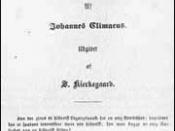Cleanthes argues that the existence of God and His similarity to manÃÂs mind can be conceived through proofs of nature. Cleanthes relies on the premise a posteriori, which is conveyed through his observations of the world and his analogy of the world as a great machine subdivided into a infinite number of lesser machines. Although the nature of God lacks a proper comparison for human understanding, Cleanthes extends his knowledge of machines to prove manÃÂs resemblance of God on a far lesser scale. Like a machine, man, must have derived from a being superior to its creation. Cleanthes defends his argument that God is the supreme creator of the world, who shares a resemblance with man, his own creation.
Demea, the first to question Cleanthes, refutes his claim that man is similar to God. Demea declares man, finite, weak, and blind creatures in comparison to God, the perfect Being whose attributes and divinity are mysterious and deserving of our humility.
However, unlike Cleanthes who logically offers a reason for GodÃÂs supremacy, Demea holds any attempt to understand the obscurities of God as profane and submits a weak argument for GodÃÂs perfect nature, saying, ÃÂHe is a Being infinitely perfect: Of this we cannot doubtÃÂ (Part 2, 14).While Cleanthes supports his reasoning of God as the superior creator of the world, Demea who goes beyond addressing God as superior but perfect, fails to justify his statement logically. Demea goes onto address the limitations of humanity by acknowledging our idea of perfection, limited to our human minds, as well as indirectly providing reason for GodÃÂs supremacy. God, as neither a spirit or a material being, is not limited to human constraints and therefore carries a different name, He that is, which conveys action in contrast to human names that are nouns. This...


